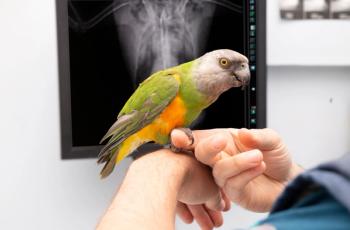
9 signs that it might be time for a change
If ... like Rodney Dangerfield, you get no respect ... your boss takes all the good clients ... or you're so busy you can't remember what your spouse looks like.
By Craig Woloshyn, DVM
1. Sometimes in the crush of busy workdays, it's hard to see the forest for the trees. You may have a vague feeling that things aren't right in your job, but you just can't put your finger on the problem.
Well, here's some help. Look for these warning signs that things are amiss at your practice. If you see yourself in these situations, take a step back and look for solutions.
Your diploma isn't on the wall. An associate can only be as successful as her practice allows; you need support. In fact, you should get the same support and respect your boss gets. If you don't, ask why. Does your team view you as temporary help passing through? A practice that wants to keep you will hang your diploma on the wall, print your name on the door, and offer a staff that respects and helps you.
2. Your work eats up more than 30 percent of your time. There are 168 hours in a week. If you work 30 percent of them, that's about 50 hours. That leaves you 118 hours for the rest of your life. Subtract 60 hours for sleep and brushing your teeth, and you get 58, which is a bit more waking time away from work than at work. Any less than this, and you enter the burnout range for most people.
It is entirely possible to earn an above-average income working 40 hours a week--lots of your peers do it. Medical practice is like drinking from the Great Lakes: No matter how much you drink, there are always more patients out there than you can see, so set limits and live by them.
3. Your significant other starts feeling insignificant. Everyone has had to cancel a dinner date for an emergency patient. If it happens occasionally, that's just part of the job. But if you're constantly late or you regularly cancel personal appointments because of work, something's got to give. Even worse is the case when you can't make personal appointments at all because you have no idea when you'll be done at the office.
Your job should have a starting time, a lunch break (with no surgery or phone calls!), and a finish time. Time management becomes a lost art if you don't practice it.
4. Your boss sees all the good clients. Clients may voice their preference for doctors, but that's just a preference. What you want is for your boss to tell the pet owner, "Dr. Newbie is one of the best new doctors out there, so I'd like her to look at Rexie. If you still want me to, I'll examine him afterward." If you don't get that kind of support, I'm not sure how you'll ever learn your craft.
When it comes to surgery, I often see the convoluted logic that because you are slow, the boss does surgeries, especially the hard, long ones. Sure, you're a crummy, slow surgeon, but we all were once. If you can't hone your skills on the job, you'll soon become slower and more incompetent. That's not a good thing in a general practitioner.
5. Your credit card debt is growing. You probably graduated with some pretty sizable debt, but after a while it should begin to decrease. Of course, you need to be frugal and defer your new Mercedes for a while, but such basics as rent and groceries shouldn't come hard after your first six months or year in a job. And you should be putting aside some savings for retirement.
If you're constantly worrying about your finances, review your salary and personal spending habits. Are you being paid what you're worth? Are you being extravagant? An accountant or financial advisor can help, and the fees for their services are well worth the improvement in your financial picture.
6. You'd rather drive by the clinic than go in. Ever have one of those days when you sit in the parking lot and have to force yourself to get out of the car and go through the clinic's front door? Have you had more than one? News flash! That's not healthy.
Yes, there are stressors at work, but you should arrive eager to solve them with the help of your trained and dedicated staff. The work itself provides enough stress: diagnoses that elude you, medications that don't perform as advertised, and patients that didn't read the textbooks. The rest of the workplace should support you in alleviating those stresses, not create more. If a feuding staff, recalcitrant owners, and eternally absent bosses are adding to your troubles, it's high time to do something about it.
7. Your boss just won't refer. Our future lies with an integrated profession, with general practitioners forming the middle tier. Specialist hospitals and universities are the top tier, and at the bottom--well, that's another subject. If you don't develop a healthy referral and information network, you won't be able to keep up with the rest of us and your good patients will end up somewhere else. Don't let that happen.
The days of a GP going it alone are long gone, and our patients benefit from frequent referrals. If you have specialists nearby and don't use them, set up a meeting with them and start. If you're geographically isolated and have no local specialists, use the Internet and the phone to get second opinions for your charges.
8. You take emergencies. Handling your own emergencies isn't good for you, your clients, or your patients. In fact, it was never a good idea, but it was once a necessity. Today, urban areas and many suburban areas have designated emergency clinics. If you're in a rural area, rotate emergency calls with colleagues. It's not ideal, but it's better than doing it all by yourself.
If you or your boss think you can offer better care to clients late at night, without staff, think again. The worst emergency clinic is better than that.
9. You envy the grade-school bus driver you pass on your way to work. OK, no practice is that bad, is it? If it is, move on.
These are some of the signs that you've got problems at work. What to do about them is another matter. Of course, all roads lead to the practice owner, so start there, and see if you can get some changes made. Many owners welcome input from someone interested in fixing problems and improving the practice.
In the end, if all your efforts are in vain, remember that your career is the important thing. You have to protect and nourish it.
Dr. Craig Woloshyn, a Veterinary Economics Editorial Advisory Board member, supports two talented associates with his words and actions at the Animal Medical Clinic in Spring Hill, Fla., which he owns. He also shares his advice through Sun Dog Veterinary Consulting.
Newsletter
From exam room tips to practice management insights, get trusted veterinary news delivered straight to your inbox—subscribe to dvm360.




